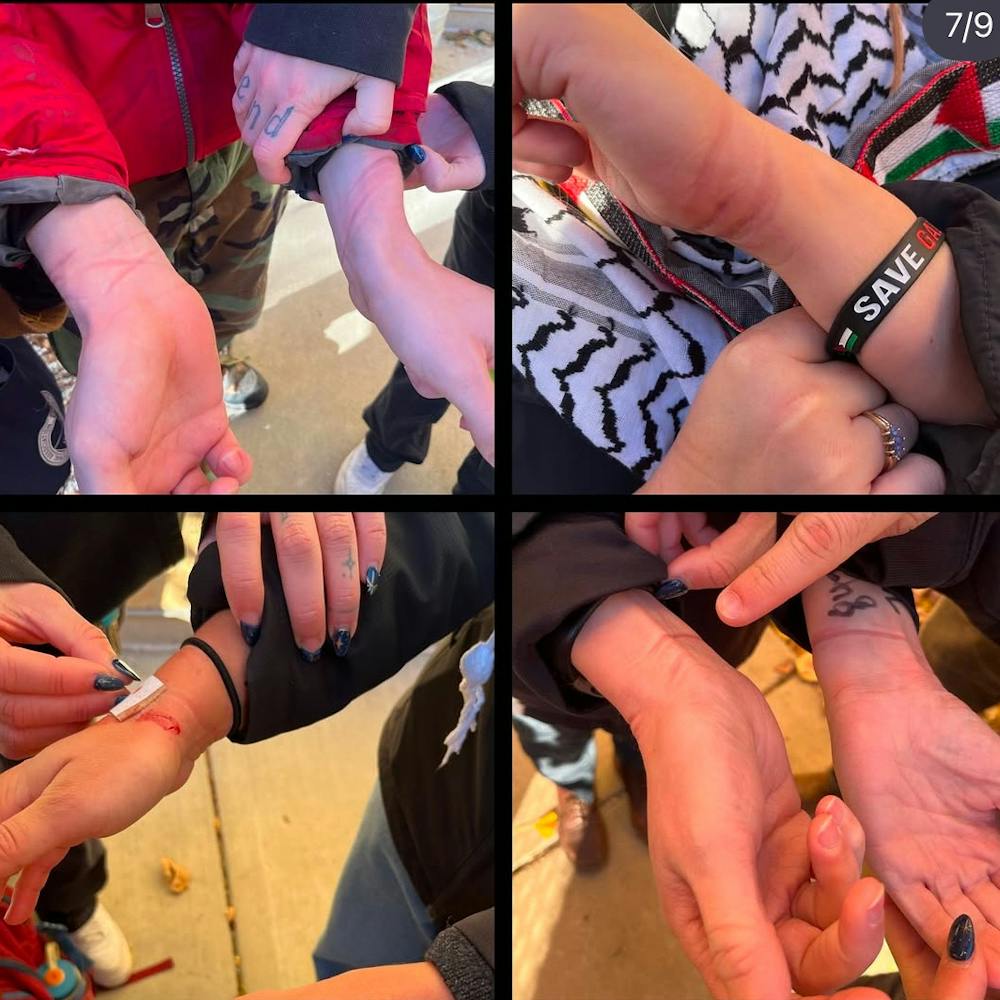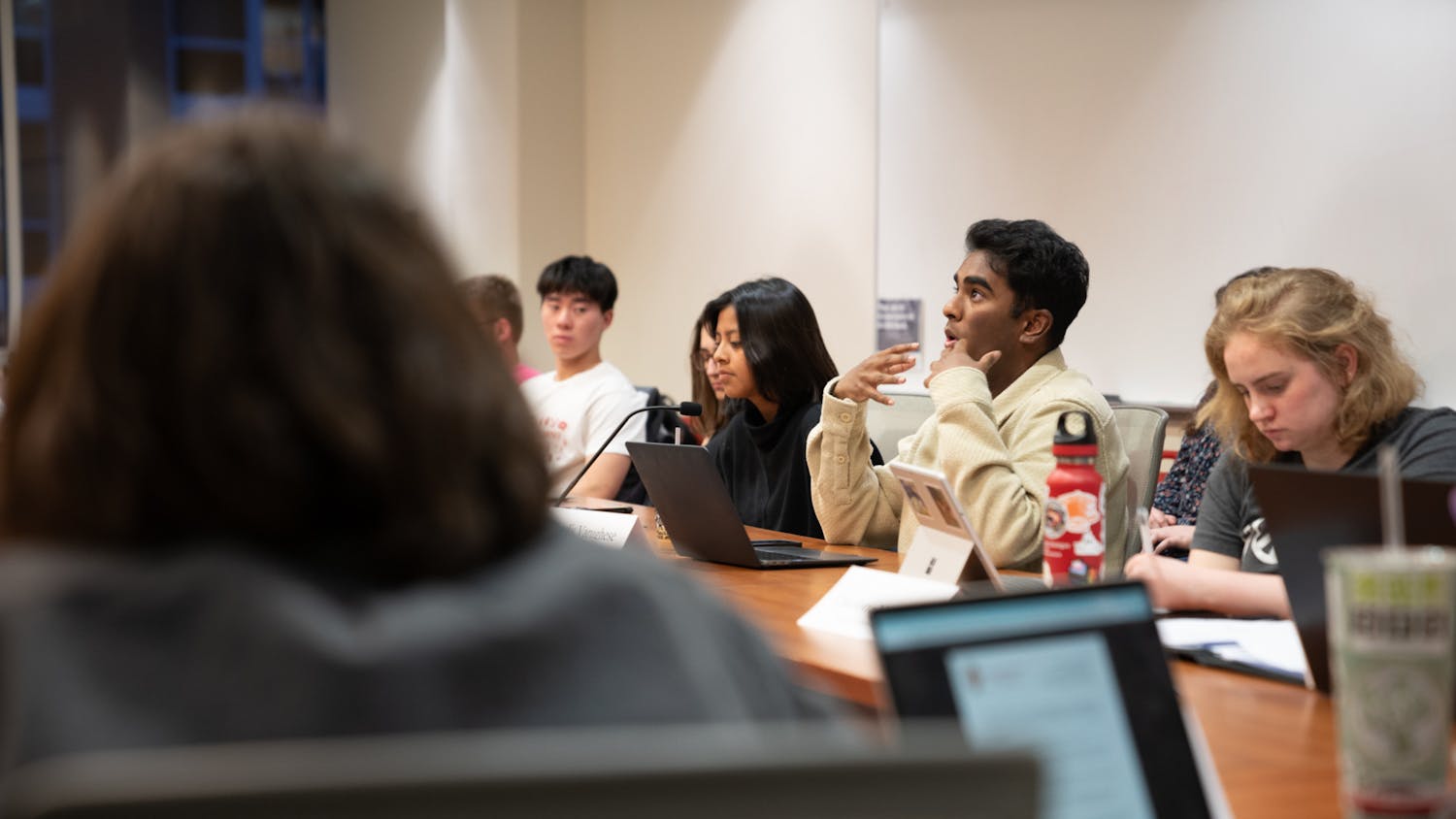The Office of Student Conduct and Community Standards (OSCCS) launched an investigation Thursday into University of Wisconsin-Madison Students for Justice in Palestine (SJP) for allegedly violating the university’s Expressive Activity Policy during their protest at a Board of Regents meeting earlier that morning.
A source familiar with SJP shared documents with The Daily Cardinal that said the organization may have violated the rules in the RSO Code of Conduct through the “use of university facilities and grounds,” “obstruct[ing] orderly conduct” and “fail[ing] to comply” with administration when around 50 protesters disrupted the Board of Regents meeting Thursday morning demanding the university financially and socially divest from Israel.
Investigating Officer Aaron Vieth said in the documents the organization will face “further sanctions up to and including termination of RSO status” if he recommends them to be guilty of violations in probation requirements in effect since October and RSO Code of Conduct policy.
Assistant Dean of Students and OSCCS Director Tonya Schmidt previously said in September that under normal circumstances she would recommend SJP be suspended as an RSO, but because campus administration and SJP struck a May agreement to end the pro-Palestine encampment, the university considered this a “mitigating factor” and approved a 10-month probation instead of suspension on Oct. 3, 2024.
SJP is responsible for scheduling an investigatory interview by 4:30 p.m. on Dec. 15, 2024 and will have seven calendar days after Vieth’s recommendation to request a hearing for the case. If no hearing is requested by this deadline, Vieth’s recommendation will become the university’s final decision.
Vieth said external judicial bodies may also investigate SJP or its members about the protest, and if the organization disbands during the disciplinary process, it may be added to the “Student Organizations Not in Good Standing” letter.
“If this happens and Students for Justice in Palestine would like to become registered as a student organization again in the future, the organization will have to petition for reinstatement no matter what the outcome of the disciplinary process is,” Vieth said in the documents.
University spokesperson John Lucas told the Cardinal Friday that “UW supports the right to free expression within the bounds of the law and campus policy” and that the investigation and arrests were due to “disruptive behaviors” and violation of the Expressive Activity Policy.
SJP spokesperson Dahlia Saba defended the protest and told the Cardinal Thursday that university police “brutally assaulted protesters and arrested 19 people seemingly at random.” WKOW-27 reported Thursday that protesters said police “forcibly slammed” a protester against a wall while following instructions to walk away.
“SJP protested the business and finance meeting of the Board of Regents to demand that they disclose their investments and, in accordance with Wisconsin law, divest from companies complicit in Israeli apartheid,” Saba said. “Now, the university is again putting SJP through a disciplinary process to punish us for calling out the university’s unethical and illegal investment practices.”

SJP posted photos Friday of protesters’ wrists bleeding due to restraints after their arrests.
UWPD spokesperson Marc Lovicott told the Cardinal Friday the police did not assault protesters and instead restrained them with handcuffs or “disposable flex-cuffs” which are similar to large zip ties. He said an officer accidentally “nicked the wrist” of a student while releasing them, but UWPD staff treated the injury.
“This is a common tactic with this type of group we saw in May as well, where these just ridiculous, false claims are made,” Lovicott said. “I think the videos on social media speak for themselves as to how we tried to get protesters to clear the room so the meeting could legally go on as was needed.”
UW-Milwaukee student and co-chair of Students for a Democratic Society Audari Tamayo was among the 19 people arrested earlier today. He called the investigation “bogus” and said UW-Madison’s Expressive Activity Policy, which puts restrictions on “expressive activity” within 25 feet of university buildings, essentially criminalizes protest on campus.
“Across the country, SJP chapters are getting banned and investigated for standing up, fighting back and not taking no for an answer,” Tamayo told the Cardinal Thursday. “When all is said and done, the universities and anybody who restricted the ability of the community to protest are going to be on the wrong side of history. It’s not going to make us stop.”
UW-Madison community and environmental sociology professor Samer Alatout, faculty advisor for SJP, said the university is “absolutely disgraceful” for “mak[ing] the issue about student disruption while a genocide is raging on in Gaza.” He said Palestinians are being “asked to disappear *poof* silently and without a whimper.”
“Students are requesting for transparency of investment decisions, for UW Foundation to follow state’s laws which reject profiting from investments in companies that condone “discrimination on the basis of race, religion, color, and sex,” Alatout said. “Genocide, as a matter of fact, violates all those provisions.”
This story was updated at 1:36 p.m. on Friday, Dec. 6, 2024 to include Lucas' statement, corrections on RSO policy and additional claims from protesters surrounding UWPD conduct.
This story was updated at 3:00 p.m. on Friday, Dec. 6 to include Lovicott’s statement and response to protesters' claims.
College Editor Mary Bosch contributed reporting to this story.
Sreejita Patra is a senior staff writer and the former summer ad sales manager for The Daily Cardinal. She has written for breaking news, campus news and arts and has done extensive reporting on the 2024 presidential race. She also covered the Oregon Village Board for the Oregon Observer.






